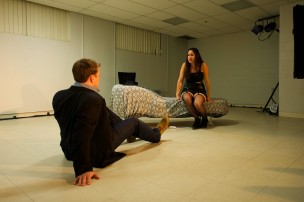
“Venus in Fur” begins with a thunderclap. This disruptive, surging sound cues David Ives’ play, directed by Sofie Somoroff ’18 on the Wesleyan stage. Through the thunderclap, one enters into a theatrical world. A world of surging, passionate, ambiguous desperation. The play locks into focus from the first sound. It introduces itself as something dangerous, powerful—something that demands not to be ignored.
“I saw the show when it first came out on Broadway, and it’s still one of the best plays I’ve ever seen,” Somoroff said. “David Ives is either a genius or a sick monster. Bit of both.”
In “Venus in Fur,” Thomas (Brett Keating ’15), an exasperated, self-important writer-director, is failing to find an actress that can play the lead role in his upcoming adaptation of Leopold von Sacher-Masoch’s “Venus in Fur” (Masoch’s name is the root of “masochism”). He paces around a decaying, industrial theater angrily, declaring the unworthiness of all women. At the end of the day’s auditions, Vanda (Sivan Battat ’15) enters the theater, bubbling with uncouth energy. Thomas reluctantly lets her audition, and the world of his script bleeds into the world of the play, as these two people struggle for creative, theatrical, and sexual dominance.
“Wesleyan theater is very socially conscious,” Somoroff said. “It was very interesting to put this on here. There are a lot of things here that just walk this line. Is it ok? Isn’t it?”
Ives’ play takes the simple premise of an audition and lets it expand dangerously. This is metatheater, plays within plays, characters within characters, commentary layered on top of commentary. The script, filled with knots and loops, is almost a flesh-and-blood character in itself. It tackles issues of gender, sex, pain, performance, and power itself unsparingly. Thomas might just be a chauvinist masquerading as a progressive; Vanda could be just an out-of-work actress, or something infinitely more powerful. The two actors occupy the space, giants in small gestures.
“This is a two-person show,” said Celina Bernstein ’18, the show’s stage manager. “Deciding who was going to be in this show was deciding what this show was going to become.”
Somoroff and Bernstein chose well. Keating’s Thomas is instantly likeable. He brings a gentleness and nervousness to the character, and a genuine love for Sacher-Masoch’s text that makes him someone worth following. His growing investment in the audition begins humorously—delicately and spectacularly teetering on the edge of melodrama—until it becomes apparent that there is something inside the character, something searing and poisonous. Keating never lets Thomas get too cloying, or too self-important, or too loathsome. It’s a performance characterized by poise and control, defined more by its whispers than its explosions.
“Brett helped us see the humanity in Thomas,” said Ruby Lanet ’18, the assistant director. “We all kind of hated the character.”
Thomas is the play’s first character, but Vanda is its center, and Battat fills this role with aplomb. She plays Vanda always as a character, never a caricature. Like Thomas, but more amplified, Vanda is a source of wit and warmth and power and terror. As Vanda gains more control of the audition, Battat begins to give the character a stillness, a deliberate energy. She may be in lingerie, but in her more-than capable hands, this is not a seduction. Vanda is a character with innumerable layers and levels, and in the wrong hands could devolve into something retrogressive and offensive. These are not the wrong hands.
“Sivan was very cautious about making sure that her portrayal was in no way anti-feminist,” Lanet said.
The chemistry between the two actors is remarkable. The quick, expertly crafted pace of their interplay lifts “Venus in Fur” through its 90-minute runtime, and provides a solid anchor as the play adds layers of metacommentary and shifts from very funny, to scary and funny, to just scary. There is a tension that slowly bubbles, a rising danger that pulls the audience through a world as uncomfortable as it is powerful.
“I’ve had a lot of people ask me ‘is the show going to be good?’” Bernstein said. “I have a lot of trouble responding to them. I don’t think people should see the show because it’s gonna be amazing, I think they should see the show because they want to experience something crazy and think and talk about it.”
“Venus in Fur” runs Thursday, March 26 through Saturday, March 28. It is crazy, thought provoking, and uncomfortable. It roars and rages, pressing down on cuts and bruises, bending reality to its breaking point.


Leave a Reply